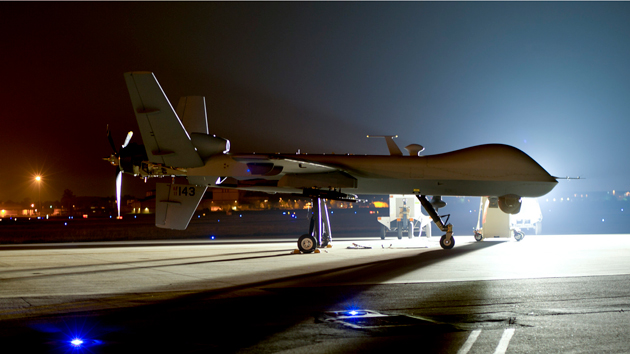
<a href="https://www.flickr.com/photos/usairforce/13991119140/in/photolist-njm9h5-oksT8q-7MBf8b-7MBf49-9NF42G-oVHE3p-9NC5eF-9ND6qW-9NvgtE-oVGE6K-ekW2f7-8mpYBw-5p2WHA-9LSp9S-cwQUFA-9NxKaD-ny4gus-9MnZH8-9ND1jY-7yMunZ-9NHcFm-9NC2JV-9NBP6p-9NANWq-ca2vyu-9NvFDv-niBysd-duieSA-9NxRVo-fKeAGz-boA4g9-oVH1aJ-9ND8dE-csTRAj-eiFooi-pR31y-9Nv8dj-5o1its-9NE2qX-9NEaaT-jhbn2-7MxgjZ-87o6y1-BAtmT-jhbn3-9NE8ht-9NE4ke-9NBZKi-9NGqDK-jhbn4">John Bainter</a>/Flickr
This story first appeared on the TomDispatch website.
It was December 6, 2019, three years into a sagging Clinton presidency and a bitterly divided Congress. That day, the 500-page executive summary of the Senate Intelligence Committee’s long fought-over, much-delayed, heavily redacted report on the secret CIA drone wars and other American air campaigns in the 18-year-long war on terror was finally released. That day, committee chairman Ron Wyden (D-OR) took to the Senate floor, amid the warnings of his Republican colleagues that its release might “inflame” America’s enemies leading to violence across the Greater Middle East, and said:
“Over the past couple of weeks, I have gone through a great deal of introspection about whether to delay the release of this report to a later time. We are clearly in a period of turmoil and instability in many parts of the world. Unfortunately, that’s going to continue for the foreseeable future, whether this report is released or not. There may never be the ‘right’ time to release it. The instability we see today will not be resolved in months or years. But this report is too important to shelve indefinitely. The simple fact is that the drone and air campaigns we have launched and pursued these last 18 years have proven to be a stain on our values and on our history.”
Though it was a Friday afternoon, normally a dead zone for media attention, the response was instant and stunning. As had happened five years earlier with the committee’s similarly fought-over report on torture, it became a 24/7 media event. The “revelations” from the report poured out to a stunned nation. There were the CIA’s own figures on the hundreds of children in the backlands of Pakistan and Yemen killed by drone strikes against “terrorists” and “m![]() ilitants.” There were the “double-tap strikes” in which drones returned after initial attacks to go after rescuers of those buried in rubble or to take out the funerals of those previously slain. There were the CIA’s own statistics on the stunning numbers of unknown villagers killed for every significant and known figure targeted and finally taken out (1,147 dead in Pakistan for 41 men specifically targeted). There were the unexpected internal Agency discussions of the imprecision of the robotic weapons always publicly hailed as “surgically precise” (and also of the weakness of much of the intelligence that led them to their targets). There was the joking and commonplace use of dehumanizing language (“bug splat” for those killed) by the teams directing the drones. There were the “signature strikes,” or the targeting of groups of young men of military age about whom nothing specifically was known, and of course there was the raging argument that ensued in the media over the “effectiveness” of it all (including various emails from CIA officials admitting that drone campaigns in Pakistan, Afghanistan, and Yemen had proven to be mechanisms not so much for destroying terrorists as for creating new ones).
ilitants.” There were the “double-tap strikes” in which drones returned after initial attacks to go after rescuers of those buried in rubble or to take out the funerals of those previously slain. There were the CIA’s own statistics on the stunning numbers of unknown villagers killed for every significant and known figure targeted and finally taken out (1,147 dead in Pakistan for 41 men specifically targeted). There were the unexpected internal Agency discussions of the imprecision of the robotic weapons always publicly hailed as “surgically precise” (and also of the weakness of much of the intelligence that led them to their targets). There was the joking and commonplace use of dehumanizing language (“bug splat” for those killed) by the teams directing the drones. There were the “signature strikes,” or the targeting of groups of young men of military age about whom nothing specifically was known, and of course there was the raging argument that ensued in the media over the “effectiveness” of it all (including various emails from CIA officials admitting that drone campaigns in Pakistan, Afghanistan, and Yemen had proven to be mechanisms not so much for destroying terrorists as for creating new ones).
There were the new tidbits of information on the workings of the president’s “kill list” and the convening of “terror Tuesday” briefings to target specific individuals around the world. There were the insider discussions of ongoing decisions to target American citizens abroad for assassination by drone without due process of law and the revealing emails in which participants up to presidential advisers discussed how exactly to craft the exculpatory “legal” documents for those acts at the Department of Justice.
Above all, to an unsuspecting nation, there was the shocking revelation that American air power had, in the course of those years, destroyed in whole or in part at least nine wedding parties, including brides, grooms, family members, and revelers, involving the deaths of hundreds of wedding goers in at least three countries of the Greater Middle East. This revelation shocked the nation, resulting in headlines ranging from the Washington Post‘s sober “Wedding Tally Revealed” to the New York Post‘s “Bride and Boom!“
But while all of that created headlines, the main debate was over the “effectiveness” of the White House’s and CIA’s drone campaigns. As Senator Wyden insisted that day in his speech:
“If you read the many case studies in the executive summary of our report, it will be unmistakable not only how ineffective American air power has been over these years, but how, for every ‘bad guy’ taken out, the air strikes were, in the end, a mechanism for the mass creation of terrorists and a continuing, powerful recruitment tool for jihadist and al-Qaeda-linked organizations across the Greater Middle East and Africa. If you doubt me, just count the jihadis in our world on September 10, 2001, and today in the areas of Pakistan, Yemen, Libya, and Somalia where our major drone campaigns have taken place, as well, of course, as in Iraq and Afghanistan. Then tell me with a straight face that they ‘worked.'”
As with the 2014 torture report, so the responses of those deeply implicated in the drone assassination campaigns and the loosing of American air power more generally in the backlands of the planet put on display the full strength of the American national security state. It was no surprise, of course, when CIA Director David Petraeus (on his second tour of duty at the Agency) held the usual Langley, Virginia, news conference—an unknown event until then-Director John Brennan first held one in December 2014 to dispute the Senate torture report. There, as the New York Times described it, Petraeus criticized the latest report for being “‘flawed,’ ‘partisan,’ and ‘frustrating,’ and pointed out numerous disagreements that he had with its damning conclusions about the CIA’s drone program.”
 The real brunt of the attack, however, came from prominent former CIA officials, including former directors George Tenet (“You know, the image that’s been portrayed is we sat around the campfire and said, ‘Oh boy, now we go get to assassinate people.’ We don’t assassinate people. Let me say that again to you, we don’t assassinate people. O.K.?”); Mike Hayden (“If the world had acted as American air power has done in these years, many people who shouldn’t have gotten married wouldn’t have gotten married and the world would be a saner place for marriage.”); and Brennan himself (“Whatever your views are on our drone program, our nation and in particular this agency did a lot of things right during a difficult time to keep this country strong and secure and you should be thanking them, not undermining them.”). Hayden, Brennan, and national security, intelligence, and Pentagon officials also blanketed the news and the Sunday morning talk shows. Former CIA Director of Public Affairs Bill Harlow, who had set up the website ciasavedlives.com to defend the patriotic honor of the Agency at the time of the release of the Senate torture report, repeated the process five years later with the website dontdronethecia.com.
The real brunt of the attack, however, came from prominent former CIA officials, including former directors George Tenet (“You know, the image that’s been portrayed is we sat around the campfire and said, ‘Oh boy, now we go get to assassinate people.’ We don’t assassinate people. Let me say that again to you, we don’t assassinate people. O.K.?”); Mike Hayden (“If the world had acted as American air power has done in these years, many people who shouldn’t have gotten married wouldn’t have gotten married and the world would be a saner place for marriage.”); and Brennan himself (“Whatever your views are on our drone program, our nation and in particular this agency did a lot of things right during a difficult time to keep this country strong and secure and you should be thanking them, not undermining them.”). Hayden, Brennan, and national security, intelligence, and Pentagon officials also blanketed the news and the Sunday morning talk shows. Former CIA Director of Public Affairs Bill Harlow, who had set up the website ciasavedlives.com to defend the patriotic honor of the Agency at the time of the release of the Senate torture report, repeated the process five years later with the website dontdronethecia.com.
Former CIA Director Leon Panetta repeated his classic statement of 2009, insisting to a range of media interviewers that the drone campaign was not just “effective,” but still “the only game in town in terms of confronting or trying to disrupt the al-Qaeda leadership.” Former President Barack Obama did an interview with NBC News from his new presidential library, still under construction in Chicago, saying in part, “We assassinated some folks, but those who did so were American patriots working in a time of great stress and fear. Assassination may have been necessary and understandable in the moment, but it is not who we are.” And 78-year-old former Vice President Dick Cheney, who appeared on Fox News from his Wyoming ranch, insisted that the new Senate report, like the old one, was a “gob of unpatriotic hooey.” President Hillary Clinton, interviewed by BuzzFeed, said of the report, “One of the things that sets us apart from other countries is that when we make mistakes, we admit them.” She did not, however, go on to admit that the still ongoing drone program or even the wedding air strikes were “mistakes.”
On December 11th, as everyone knows, the mass junior high school shootings in Wisconsin occurred and media attention quite understandably shifted there, 24/7. On December 13th, Reuters reported that a drone attack in Pakistan’s tribal borderlands, which was “suspected” of killing seven “militants,” including possibly an al-Qaeda sub-commander—local residents reported that two children and a 70-year-old elder had been among the dead—was the thousandth drone strike in the CIA’s secret wars in Pakistan, Yemen, and Somalia.
Running a Criminal Enterprise in Washington
It’s not 2019, of course. We don’t know whether Hillary Clinton will be elected president or Ron Wyden reelected to the Senate, no less whether he’ll become the chairman of the Senate Intelligence Committee in a body once again controlled by Democrats, or whether there will ever be a torture-report-style investigation of the “secret” drone assassination campaigns the White House, the CIA, and the US military have been running across the backlands of the planet.
Still, count me among the surprised if, in 2019, some part or parts of the US national security state and the White House aren’t still running drone campaigns that cross national borders with impunity, kill whomever those in Washington choose in “terror Tuesday” meetings or target in “signature strikes,” take out American citizens if it pleases the White House to do so, and generally continue to run what has proven to be a global war for (not on) terror.
When it comes to all of this “secret” but remarkably well-publicized behavior, as with the CIA’s torture program, the US has been making up the future rules of the road for the rest of the world. It has created a gold standard for assassination and torture by green-lighting “rectal rehydration” (a euphemism for anal rape) and other grim acts. In the process, it has cooked up self-serving explanations and justifications for actions that would outrage official Washington and the public generally if any other country committed them.
This piece, of course, is not really about the future, but the past and what we should already know about it. What’s most remarkable about the Senate torture report is that—except for the odd, grim detail like “rectal rehydration”—we should never have needed it. Black sites, torture techniques, the abusing of innocents—the essential information about the nightmarish Bermuda Triangle of injustice the Bush administration set up after 9/11 has been publicly available, in many instances for years.
Those “2019” revelations about drone assassination campaigns and other grim aspects of the loosing of American air power in the Greater Middle East have been on the public record for years, too. In truth, we shouldn’t be in any doubt about much of what’s billed as “secret” in our American world. And the lessons to be drawn from those secret acts should be obvious enough without spending another $40 million and studying yet more millions of classified documents for years.
Here are three conclusions that should now be obvious enough when it comes to Washington’s never-ending war on terror and the growth of the national security state.
1. Whatever grim actions are the focus of debate at the moment, take it for granted that they don’t “work” because nothing connected to the war on terror has worked: The coverage of the Senate torture report has been focused on arguments over whether those “enhanced interrogation techniques,” or EITs, “worked” in the years after 9/11 (as in 2019, the coverage would undoubtedly focus on whether drone assassination campaigns had worked). The executive summary of the Senate report has already offered numerous cases where information gained through torture practices did not produce actionable intelligence or stop terror plots or save lives, though misinformation from them might have helped embolden the Bush administration in its invasion of Iraq.
Bush administration officials, former CIA directors, and the intelligence “community” in general have vociferously insisted on the opposite. Six former top CIA officials, including three former directors, publicly claimed that those torture techniques “saved thousands of lives.” The truth, however, is that we shouldn’t even be having a serious discussion of this issue. We know the answer. We knew it long before the redacted executive summary of the Senate report was released. Torture didn’t work, because 13 years of the war on terror has offered a simple enough lesson: nothing worked.
You name it and it failed. It doesn’t matter whether you’re talking about invasions, occupations, interventions, small conflicts, raids, bombing runs, secret operations, offshore “black sites,” or god knows what else—none of it came close to succeeding by even the most minimal standards set in Washington. In this period, many grim things were done and most of them blew back, creating more enemies, new Islamic extremist movements, and even a jihadist mini-state in the heart of the Middle East that, fittingly enough, was essentially founded at Camp Bucca, an American military prison in Iraq. Let me repeat that: if Washington did it any time in the last 13 years, whatever it was, it didn’t work. Period.
2. In national security and war terms, only one thing has “worked” in these years and that’s the national security state itself: Every blunder, every disaster, every extreme act that proved a horror in the world also perversely strengthened the national security state. In other words, the crew that couldn’t shoot straight could do no wrong when it came to their own agencies and careers.
No matter how poorly or badly or stupidly or immorally or criminally agents, operatives, war fighters, private contractors, and high officials acted or what they ordered done, each disaster in this period was like a dose of further career enhancement, like manna from heaven, for a structure that ate taxpayer dollars for lunch and grew in unprecedented ways, despite a world that lacked all significant enemies. In these years, the national security state entrenched itself and its methods in Washington for the long run. The Department of Homeland Security expanded; the 17 interlocked intelligence agencies that made up the US intelligence community exploded; the Pentagon grew endlessly; the corporate “complexes” that surrounded and meshed with an increasingly privatized national security apparatus had a field day. And the various officials who oversaw every botched operation and sally into the world, including the torture regime the Bush administration created, were almost to a man promoted, as well as honored in various ways and, in retirement, found themselves further honored and enriched. The single lesson from all of this for any official was: whatever you do, however rash, extreme, or dumb beyond imagining, whatever you don’t accomplish, whomever you hurt, you are enriching the national security state—and that’s a good thing.
3. Nothing Washington did could ever qualify as a “war crime” or even a straightforward crime because, in national security terms, our wartime capital has become a crime-free zone: Again, this is an obvious fact of our era. There can be no accountability (hence all the promotions) and especially no criminal accountability inside the national security state. While the rest of us are still in legal America, its officials are in what I’ve long called “post-legal” America and in that state, neither torture (to the point of death), nor kidnapping and assassination, nor destroying evidence of criminal activity, perjury, or the setting up of an extralegal prison system are crimes. The only possible crime in national security Washington is whistleblowing. On this, too, the evidence is in and the results speak for themselves. The post-9/11 moment has proven to be an eternal “get out of jail free card” for the officials of two administrations and the national security state.
Unfortunately, the obvious points, the simple conclusions that might be drawn from the last 13 years go unnoticed in a Washington where nothing, it seems, can be learned. As a result, for all the sound and fury of this torture moment, the national security state will only grow stronger, more organized, more aggressively ready to defend itself, while ridding itself of the last vestiges of democratic oversight and control.
There is only one winner in the war on terror and it’s the national security state itself. So let’s be clear, despite its supporters who regularly hail the “patriotism” of such officials, and despite an increasingly grim world filled with bad guys, they are not the good guys and they are running what, by any normal standards, should be considered a criminal enterprise.
See you in 2019.
Tom Engelhardt is a co-founder of the American Empire Project and the author of The United States of Fear as well as a history of the Cold War, The End of Victory Culture. He runs the Nation Institute’s TomDispatch.com. His new book is Shadow Government: Surveillance, Secret Wars, and a Global Security State in a Single-Superpower World (Haymarket Books). To stay on top of important articles like these, sign up to receive the latest updates from TomDispatch.com here.
[Note on weddings: On the issue of wedding parties obliterated by American air power, a subject TomDispatch has been covering for years, I had counted news reports on seven of them by the time an eighth, a Yemeni wedding party, was blown away in December 2013. Since then, a correspondent has pointed out to me a report that a ninth wedding party, the second in Iraq, may have been hit by US air power on October 8, 2004, in the city of Fallujah, with the groom dying and the bride wounded.]















